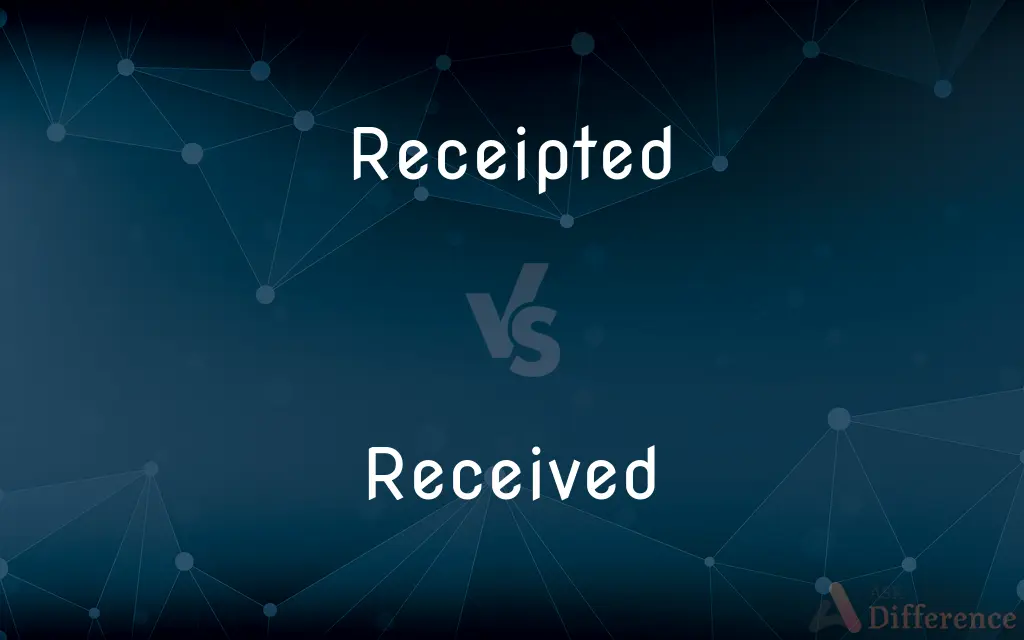Receipted vs. Received — What's the Difference?
By Fiza Rafique & Urooj Arif — Updated on March 18, 2024
Receipted refers to marking a transaction or item as having been acknowledged with a receipt, indicating a formal record. Received denotes the act of taking or accepting something that has been sent or given.

Difference Between Receipted and Received
Table of Contents
ADVERTISEMENT
Key Differences
Receipted is a term that specifically relates to the action of providing or acknowledging a receipt for a transaction or item, suggesting that there is a formal record of the exchange or acknowledgment. Received, on the other hand, is a more general term that encompasses the act of taking or accepting something that has been offered, sent, or given, regardless of the context or the existence of a formal acknowledgment like a receipt.
The term "receipted" carries with it the implication of a completed process, not just in the physical transfer of an item or service, but also in the formal acknowledgment and documentation of that transfer. This is crucial in business transactions where such documentation is necessary for accounting, tax, or legal purposes. Conversely, "received" simply denotes the act of acceptance or taking possession and does not inherently include any formal acknowledgment or documentation.
In some cases, the process of receiving something can lead to it being receipted if the context requires a formal acknowledgment. For instance, when a shipment arrives at a warehouse, it is first received and then may be receipted once the receiving department has checked and acknowledged the goods against an invoice or purchase order.
The distinction between the two terms highlights the difference between the physical or metaphorical act of accepting something and the formal process of documenting that acceptance. While "received" focuses on the action of acceptance, "receipted" emphasizes the documentation and formal acknowledgment of that action, making it an essential term in contexts where such formalities are necessary.
Comparison Chart
Definition
Marking a transaction or item as acknowledged with a receipt.
Taking or accepting something that has been sent or given.
ADVERTISEMENT
Context
Primarily used in financial and business contexts for documentation.
Applies broadly to any act of taking or accepting, regardless of context.
Implication
Implies a formal record of acknowledgment.
Simply denotes the act of acceptance, without implying documentation.
Usage
Used when there is a need for formal documentation of a transaction.
Used in a wide range of scenarios, from physical goods to information.
Process
Indicates a completed process including acknowledgment and documentation.
Focuses on the action of acceptance or taking possession.
Compare with Definitions
Receipted
Acknowledged with a receipt.
The payment was receipted and filed for accounting purposes.
Received
Act of taking or accepting.
The package was received at the front desk.
Receipted
Reflects a completed transaction.
The invoice was marked as receipted once the payment was confirmed.
Received
Applies to various contexts.
The news was received with mixed emotions.
Receipted
Indicates formal documentation.
All receipted items are recorded in the monthly financial report.
Received
Does not imply formal documentation.
The feedback was received but not recorded.
Receipted
Used in business transactions.
The goods were delivered and receipted by the store manager.
Received
Can lead to being receipted.
Once received, the shipment will be checked and receipted.
Receipted
Essential for record-keeping.
Receipted transactions are crucial for accurate tax filings.
Received
Involves acceptance.
The proposal was received and is under review.
Receipted
A written acknowledgment that a specified article, sum of money, or shipment of merchandise has been received.
Received
Having been accepted as true or worthy, especially without firsthand corroboration
"the received wisdom that attributes academic success or failure to natural aptitudes" (Jerome Karabel).
Receipted
The act of receiving
We are in receipt of your letter.
Received
Simple past tense and past participle of receive
Receipted
The fact of being or having been received
They denied receipt of the shipment.
Received
Generally accepted as correct or true.
Receipted
Often receipts A quantity or amount received
Cash receipts.
Received
Conforming to the established language usage of educated native speakers;
Standard English
Received standard English is sometimes called the King's English
Receipted
A recipe.
Received
Widely accepted as true or worthy;
The accepted wisdom about old age
A received moral idea
Received political wisdom says not; surveys show otherwise
Receipted
To mark (a bill) as having been paid.
Receipted
To give or write a receipt for (money paid or goods or services delivered).
Receipted
To give a receipt.
Receipted
Simple past tense and past participle of receipt
Common Curiosities
What kind of transactions typically require to be receipted?
Transactions in business, financial, and legal contexts typically require to be receipted for record-keeping, accounting, and compliance purposes.
Are there legal implications for not receipting transactions?
There can be legal implications for not receipting transactions, especially in contexts where documentation is required for tax, regulatory, or contractual reasons.
What happens if a transaction is not properly receipted?
If a transaction is not properly receipted, it can lead to discrepancies in records, challenges in tracking financials, and potential issues with audits or compliance.
What does it mean when something is receipted?
When something is receipted, it means that the transaction or item has been formally acknowledged and documented with a receipt, indicating a complete record of the exchange.
How is received different from receipted?
Received refers to the act of taking or accepting something, while receipted involves providing or acknowledging a formal receipt, indicating documentation of the transaction.
Can an item be received without being receipted?
Yes, an item can be received without being receipted, especially in informal contexts or situations where no formal acknowledgment or documentation is necessary.
Is a receipt always necessary when something is received?
A receipt is not always necessary when something is received, as it depends on the context and the need for formal documentation of the acceptance or transaction.
Can digital transactions be receipted?
Yes, digital transactions can be receipted, often through electronic receipts or digital records, which serve the same purpose as paper receipts in acknowledging and documenting the transaction.
How does the receipting process affect business operations?
The receipting process ensures that transactions are formally acknowledged and documented, which is crucial for accurate financial reporting, inventory management, and compliance with regulatory requirements.
How do individuals ensure they have been properly receipted?
Individuals can ensure they have been properly receipted by requesting and retaining copies of receipts for transactions, especially for significant purchases or payments.
Share Your Discovery

Previous Comparison
Nuptials vs. Nuptial
Next Comparison
Compulsion vs. CompunctionAuthor Spotlight
Written by
Fiza RafiqueFiza Rafique is a skilled content writer at AskDifference.com, where she meticulously refines and enhances written pieces. Drawing from her vast editorial expertise, Fiza ensures clarity, accuracy, and precision in every article. Passionate about language, she continually seeks to elevate the quality of content for readers worldwide.
Co-written by
Urooj ArifUrooj is a skilled content writer at Ask Difference, known for her exceptional ability to simplify complex topics into engaging and informative content. With a passion for research and a flair for clear, concise writing, she consistently delivers articles that resonate with our diverse audience.















































